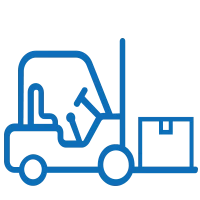March 2024
New Yale® operator assistance technologies to optimise warehouse best practices
Yale Lift Truck Technologies has launched Yale Reliant - an advanced suite of operator assistance technologies that help reinforce lift truck best practices in warehouses and intralogistics operations. The innovation was shown for the first time in Europe at LogiMAT 2024.
At the heart of Yale Reliant is advanced dynamic stability technology. This adjusts performance of the lift truck or warehouse equipment in real time, assisting the operator to not exceed the truck’s capabilities. This may be a reduction in travel speed or truck acceleration, or a reduction in lift speed or tilt speed. Whatever movement may potentially lead to an instability incident can be reduced in intensity or blocked altogether, all while the operator remains in ultimate control of the equipment. Yale Reliant also provides audible and visual alerts to aid compliance with best practices.
“Warehouse environments are often complex, and operations are increasingly under pressure to increase throughput and orders picked. However, companies also cannot ignore the importance of occupational safety for everyone working on, or close to, warehouse equipment,” says Ron Farr, Director, Warehouse Sales, EMEA from Yale Lift Truck Technologies. “The Yale Reliant Operator Assistance System (OAS) is a result of more than 29,000 hours of research and development, giving us the expertise and insight to deliver a scalable solution, driven by the real challenges of diverse intralogistics operations.”
The power of Yale Reliant comes from three core technologies. Proximity detection is provided by local or real-time location technologies that use tags on equipment, pedestrians, and infrastructure. This enables truck-to-truck, truck-to-pedestrian, and truck-to-beacon detection. Lidar-based technology (light detection and ranging) is leveraged to detect obstacles without proximity tags in the path of travel. Meanwhile, advanced dynamic stability provides advanced traction, hydraulic, and overload control to support truck stability.
These integrated technologies combine to give warehouses different ways to harness the benefits of Yale Reliant. For instance, a warehouse may use the system to control equipment speed in order to maintain a specific following distance between equipment. If required, location-based rules can also be set. For example, limiting travel speed at the end of aisles or excluding certain equipment from pedestrian areas. Warehouses can also set up the system to restrict travel and lift functions or reduce speed to avoid stability issues.
“Intralogistics applications are increasingly looking for technologies that support efficiency now, but also enable their operations to be ready for the future as warehouses evolve,” explains Ron. “Our network of independent Yale dealers are local experts who can provide insight on the right solution for the specific operation, from selecting the right truck fleet, to implementing Yale Vision telemetry, or advising on the optimal suite of operator assistance technologies – such as Yale Reliant.”
Yale Reliant is available ex-factory on selected equipment models. For more information, contact a Yale dealer or visit www.yale.com.


